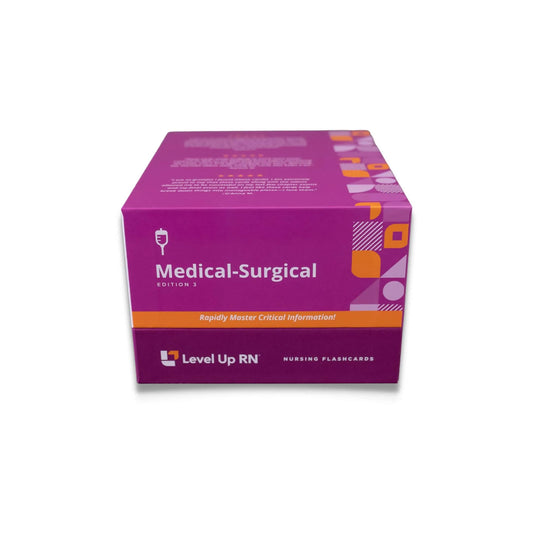In this video, Cathy gives an overview of anti-diuretic hormone (ADH), aldosterone, and the RAAS System.
Medical-Surgical Nursing - Flashcards
Antidiuretic Hormone (ADH)
What is ADH?
ADH stands for Antidiuretic Hormone. It helps to control blood pressure and blood volume in the body by regulating the absorption or excretion of water in the kidneys. When ADH increases, it causes the kidneys to reabsorb more water. When ADH decreases, it causes the kidneys to excrete more water.
Where is ADH produced?
ADH is produced by the hypothalamus and then stored and secreted from the posterior pituitary gland.
Why is ADH produced?
ADH is secreted in response to three things.
- Low blood volume. With hypovolemia, which is not enough blood volume, ADH production increases. This causes the kidneys to reabsorb more water, which helps increase blood volume
- Low blood pressure. With hypotension, ADH production increases, which causes the kidneys to reabsorb more water, which increases blood volume, which increases blood pressure.
- Hypernatremia, or increased blood osmolarity. If the blood is concentrated with sodium, the body wants to dilute it. In order to do that, the body releases ADH, which causes the kidneys to reabsorb more water, which dilutes the blood and brings the sodium levels back down.
Which diseases and disorders are related to ADH?
Insufficient ADH can lead to diabetes insipidus.
Excess secretion of ADH can lead to syndrome of inappropriate ADH (SIADH).
Aldosterone
What is aldosterone?
Aldosterone is a hormone that increases blood volume and blood pressure by causing kidney reabsorption of water and sodium. It's important to note that ADH causes reabsorption of just water, while aldosterone causes reabsorption of water as well as sodium. In addition, aldosterone causes renal excretion of potassium.
Where is aldosterone produced?
Aldosterone is produced in the adrenal cortex.
What controls the release of aldosterone?
The renin-angiotensin-aldosterone system.
Which diseases and disorders are related to aldosterone?
Too much aldosterone can lead to Hyperaldosteronism.
Addison's disease and adrenocortical insufficiency can cause insufficient aldosterone secretion.
Renin-angiotensin-aldosterone system (RAAS)
What does the RAAS system do?
When there is decreased blood flow to the kidneys, and low blood pressure, the RAAS system is triggered.
- The kidneys secrete renin.
- Renin activates angiotensinogen, which is from the liver, into angiotensin I.
- Angiotensin-converting enzyme (ACE), which is from the lungs, converts angiotensin I into angiotensin II.
- Angiotensin II triggers multiple actions to take place, and all of them increase blood pressure in the body:
- Angiotensin II causes vasoconstriction of the afferent arterioles in the nephrons, which increases sodium and water reabsorption by the kidneys.
- Angiotensin II causes aldosterone to be released from the adrenal cortex. Remember that aldosterone causes the reabsorption of sodium and water by the kidneys.
- Angiotensin II causes vasoconstriction of blood vessels throughout the body. When the blood vessels are constricted, that helps to increase blood pressure.
Understanding these hormones and how this system works is crucial to understanding the pathophysiology of the related diseases and disorders of the Endocrine System. The Medical-Surgical Nursing - Endocrine video tutorial series is intended to help RN and PN nursing students study for nursing school exams, including the ATI, HESI and NCLEX.



4 comments
I was wondering why only a few videos have a quiz at the end. Just like the ones after the ECG/EKG sections. I loved the ECG/EKG quizzes I retain the information from those quizzes better than I do when you ask 3 questions at the end of the video. I hope you add more quizzes.
How does one medically deal with these hormone imbalances?
I have the cards… those cards in addition to the videos really help. Thanks Cathy!
Excellent teaching